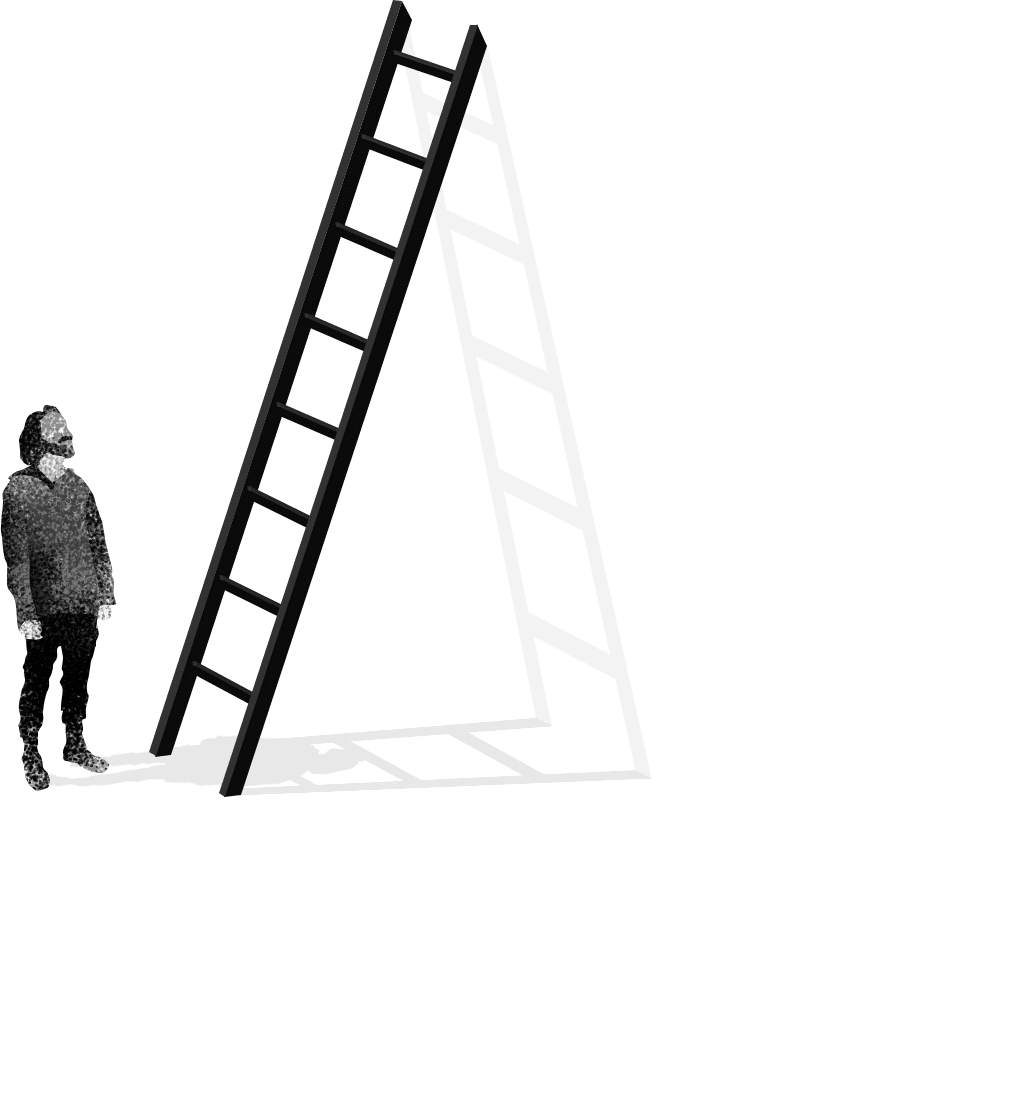A PROMISE
BROKEN
La Vie en Rose
The late 20th century manifestation of welfare
capitalism spread outwards from post-war
America into western democracies across the world.
This system of merit-based mobility, which concerned itself with ensuring corporate
productivity whilst also maintaining a social safety net, improved the standard of
living for so many, boosting both prosperity and productivity, whilst also reducing
economic inequality to the lowest levels in recorded history. It ushered in an age of
modernisation, liberalisation, labour rights and technological democratisation all
justified by extraordinary economic growth.
The new era of distributed prosperity relied on the idea that social mobility was
effectively guaranteed to those who were educated, worked hard and abided by
the laws of the land. Income became a proxy for economic value, work ethic,
effectiveness, ingenuity, knowledge and influence. It was through the creation of
economic value that people ascended the social ladder.
The new era of distributed
prosperity relied on the idea that
social mobility was effectively
guaranteed to those who were
educated, worked hard and abided
by the laws of the land.
The corporation was the vehicle through which the worker could achieve social mobility. Notionally, the
corporation should ignore prevailing
societal prejudice and discrimination in
search of profits so it was well placed to
assess those characteristics. It was
effective for 60 years. For the first time
in history, a person born poor had no
restrictions placed on their potential. The
social contract that the leaders of the
early 20th century had begun to
embroider was flourishing. Welfare
capitalism had proven to be both the most effective and equitable
economic system ever created.
The system was not without faults. Systemic misogyny and malignant racism
were baked into the institutions tasked with administering, regulating and
managing the economy. This manifested in such profound and extreme levels of
social and economic exclusion that it has shaped much of the social discourse of today.
Welfare capitalism was severely flawed but it provided a basis upon which a more
equitable society could exist. One where the interests of citizen and corporation
could cohabitate. But wars, recessions and rapid financial internationalisation
created unstoppable momentum in another direction.
The 80’s brought with it an era of political ideology called neoliberalism. Neoliberal
doctrine argues that humanity flourishes most when the owners of capital maximise
profits. The resulting policy decisions included enormous deregulation of financial
markets, the widespread privatisation of state-owned assets and the minimisation
of labour representation. Corporations were more profitable than ever, but those
profits were no longer distributed in an equitable manner, causing a rapid worsening
of economic inequality. Investors, the providers of capital, were being
disproportionately rewarded when compared to employees, the creators of value.
Massive quantitative easing post 2008 exacerbated that dynamic. Inflation
manifested principally in asset prices. Real estate prices, stock markets, venture
capital and private equity experienced a decade of extraordinary growth. Those who
owned assets benefited, whilst those who did not saw them become less accessible.
At the same time as this vast recalibration of the distribution of wealth within
advanced industrial economies, taxation regimes in many nations have grown
increasingly regressive and imbalanced. In particular, the taxation of high earners
has evolved dramatically since the end of the 1970s.
The top marginal income tax rates in the United States and the United Kingdom in
the 1970s were above 70 percent. The Reagan and Thatcher regimes led to
rate cuts of 40 percentage points
for the wealthiest citizens within a decade.
Equitable systems of taxation ensure that those at the bottom can more rapidly
ascend economic classes through access to better infrastructure and resources.
The consequence of these economic measures has,
generally, been very high levels of employment,
demand and profits but also high levels of
dissatisfaction across society. Limited wage inflation,
an inability to own a home and a sense that the
system is unfair have resulted in anger, protest and
political activism.





Two dishes,
but to one table
Economic class is a concept familiar to many.
Most people identify as part of a particular
class, be it poor, working class, middle class,
upper-middle class or upper class.
It is an identifier that shapes the way we view the world and the opportunities
and challenges it presents. It often determines the company we keep, the
employment we pursue, the values we hold close and the environments in which
we feel comfortable. Few social constructs influence the parameters we
construct around ourselves and our potential more than economic class.
This traditional class framework becomes increasingly redundant as the gap
between rich and poor grows and upward social mobility decelerates. There is
less to distinguish poor from working class from middle class than there has
been at any point in the last century. These three classes in particular are
significantly less distinct.
The internet and entertainment media have degraded the knowledge gap
between these groups.. We can see how “the other half” lives. Education has
diminished the skills gap and the economy has degraded the pay gap to the
extent that a college degree will no longer entitle someone to higher lifetime
earnings than someone without.
Heritage and inherited status means less for class than ever before. The primary
determinants of contemporary class are income and wealth. Do you have
sufficient income that you can acquire wealth and do you have sufficient wealth
that you do not require income generated through work? Will you accumulate
debt or wealth over the course of a working life?
Traditional socio-economic divisions, determined by
heritage, race and geography, are far less pronounced
than they once were. In their place have risen new
economic classes defined by wealth alone. We have
tried to classify this new economic framework in
terms of income and wealth, showcasing how wealth
accumulation at the top makes social mobility more
difficult for those at the bottom.



















All animals are equal, but
some are more equal
than others
The belief that hard work leads to success is a powerful and seductive ideology.
The truth is that intellect, work ethic and character have significantly less to do with social ascent than
gender, race and circumstantial privilege bestowed at birth. The idea that opportunity in life is linked to
individual merit has been used as a
mechanism for explaining away class inequality
and has often
functioned to reproduce structures of social exclusion rather than to work against them.
This is the “myth of meritocracy”: a powerful, persistent narrative that is often used to validate the
prominence of inherited influence
and justify the discriminatory
oppression of people more often
confined to lower rungs of the social
ladder due to circumstances of
geography or birth. Research
repeatedly has shown that the
income category of one’s parents is
likely to have a significant impact on
the probability that one will
experience social mobility, meaning
that in spite of the dominance of meritocratic myths, it is primarily the wealthy who are
most likely to enter into the elite.
Research repeatedly has shown that the
income category of one’s parents is likely to
have a significant impact on the probability
that one will experience social mobility
We see this in particular with respect to education, which is a key driver of one of the main indicators
of social mobility –
intergenerational persistence in wages
. Studies of the relationship between
education and social mobility tend to challenge “utopian” functionalist theories of industrialism, which
assume that “the complementary demands of efficiency and justice result in more ‘meritocratic’
societies,
characterised by high rates of social mobility”.
Class status also interacts with other dimensions of social exclusion. Research from the UK, for
example, demonstrates the
powerful intersections
between class background and other demographic
factors, including race, disability and gender. We can also interpret a relation between social
stratification and LGBTQIA+ identities. However, the differing ways in which sexualities are articulated
and perceived over time and across geographies make them more difficult to analyse with respect to class.
But then they found
a small hole
They’d been let down so often, Their brow was on the
floor, But then they found a small hole, And let them
down some more.
When looking for the drivers of downward social mobility, a recurring theme arises:
both economists and sociologists agree on the fact that it is usually the result of
“unexpected stressful life events”.
If the social contract of welfare capitalism were being upheld, the negative impact of
unexpected life events should be mitigated by a safety net that ensures one can quickly
return to being a net contributor to the economy.
However, the evidence clearly shows that these unexpected shocks, typically unrelated to
individual merit, are the primary drivers of downward mobility. Jessi Streib writes, “The
common story about downward mobility is
one of bad luck:
recent generations have the
misfortune of coming of age during an economic downturn, a student debt crisis,
declining job security, and, now, a pandemic.”
The above examples focus on social disruptions, but stressful life events can also come
from a personal situation. For instance, divorce or health problems can also be drivers of
downward social mobility. More precisely, a stressful life event on its own won’t
necessarily result in downward social mobility, given that not everyone is affected by
stressful life events in the same way. Rather, it has to come with the lack of a financial
safety net. Faced with these challenges, many turn instead to a
“debt safety net”
, which
becomes essential to household functioning but which can lead to a cycle of
compounding losses.
Bad luck can be exacerbated or mitigated by demographic factors. It is clear that
intellect, work ethic and attitude have far less to do with social mobility than do race,
gender, disability or inheritance.
Inheritance
The promise of welfare capitalism, oft-referred to as the “American Dream” is the idea
that any citizen, regardless of birth, can climb to the highest perch of politics, commerce
or professional life based on merit alone. This concept spread throughout the developed
world, validating the economic ascent of millions who had climbed the social ladder from
lower classes.
This has become a central tenet of contemporary democracy. Discriminatory systemic
or cultural barriers to upward social mobility are seen as anathema to civil society. Yet
despite that, we continue to facilitate massive transfers of wealth through inheritance.
Discriminatory systemic or cultural
barriers to upward social mobility are
seen as anathema to civil society. Yet
despite that, we continue to facilitate
massive transfers of wealth through
inheritance.
Most wealth is inherited – up to 65% in the US,
by some accounts.
This is determinative
in a world where assets, not income, define economic class. It also has a material impact
on those from lower classes
who exhibit merit, work ethic
and positive attitude. The
likelihood that they will
experience upward social
mobility is significantly reduced
due to their inability to access
assets through income alone. In
the UK, for example, whilst
some may have the educational
credentials and occupational
prospects that correspond to
established understandings of
what constitutes the middle
class, an explosion in property prices relative to income means there is
little prospect of
owning a middle-class home
without access to family wealth.
It is increasingly the case that
the income category of one’s parents
is likely to have a
significant impact on the probability that any one individual will experience social
mobility. The relation between income inequality and social mobility is a longitudinal
concern, the fear being that those with more significant incomes will have a greater
capacity to accrue wealth (e.g. savings, assets) whilst those on lower incomes will be
unable to do so. As with the impact of education, this would imply
a disruption of social
mobility through mechanisms of inherited wealth
when taken to an intergenerational
scale. This process is a demonstration of how differences in income or asset value can
compound over time.
The role of inherited wealth is forecast to become even more important in the future.
According to the Nuffield Foundation, inheritance will represent 8% of average lifetime
earnings for those born in the 1960s, whereas
this will rise to 14% for those born in the
1980s.
However, inheritance alone is not the only answer, given that inheritance primarily
serves to benefit those who are already wealthy.
As argued by Marc Szydik,
“Future
inheritances will continue to substantially increase the discrepancies between economic
classes”.
The language of
the unheard
Declining social mobility has a severe and
cumulative impact on all of those who hoped, one
day, for something better.
People are coming to terms with the idea that life is unlikely to improve substantially with
age, retirement is likely to be very challenging and their kids are unlikely to be better off
than they are. This is cultivating higher levels of social malcontent, frustration and
inequity, which is manifesting as activism and protest.
Research demonstrates that people who have experienced social mobility are more likely
to justify or support the status quo. The same also holds true for those who
perceive
social mobility to be possible.
The converse is also the case. In the US, for example,
perceived stagnation
in upward
social mobility is rising and is seen as
a motivator for former President Donald Trump’s
victory in 2016,
as well as for
the storming of the US Capitol
in January 2021.
Elsewhere, surveys reveal that 87% of French “Yellow Vest” protestors express the
feeling of
living in an unfair society.
In the UK, an increase in intergenerational immobility
has been linked to transformative political schisms, such as the country’s
2016 Brexit vote.
These patterns are reproduced on a global scale, a key indicator of the fact that declining
beliefs about the possibility of social mobility open up a space for political turbulence and
for societal change. Although there may be variations in the suggested routes to achieving
increased social mobility, commentary and insights from across the political spectrum
and in various national contexts come to the same conclusions: ensuring a freely moving
social elevator is
one of the most powerful mechanisms
for ensuring social cohesion and
political stability.
The end of
the beginning
Keynes was correct. The accumulation of capital and scientific advances has indeed
afforded people the opportunity to live a life in pursuit of leisure, without obligation or
necessity for labour, but that reality extends to only a small few within an emerging
economic aristocracy.
Keynes, wrongly, assumed that nations would act collectively to ensure that the pursuit of
capital for satisfaction alone would be disabused until the burden of necessity was lifted
for all. Instead, the system has facilitated the accumulation of extreme wealth for a small
minority, for whom the contribution of labour is now optional.
For those without capital, salaried income is now considerably less effective as a
mechanism for prosperity. Nevertheless, it has now been clearly established that
technology and the compounded accumulation of capital can actually relieve people of the
necessity of work and provide to them the opportunity for a life free of laborious obligation.
Technology was to be our saviour. The vehicle through which “we would come to value
ends above means and prefer the good to the useful”. Perhaps it will yet be. For now, the
uneven distribution of technology, technological capital and technological skills has
created unprecedented opportunities for individuals and challenges for an economic
system predicated on a social contract that is no longer effective. The next section will
explore the ways in which new economies are forming around digital endeavour and the
consequences for economic class in the digital age.
“The time for all this is not yet. For at least another hundred years
we must pretend to ourselves and to every one that fair is foul
and foul is fair; for foul is useful and fair is not. Avarice and usury
and precaution must be our gods for a little longer still. For only
they can lead us out of the tunnel of economic necessity into daylight.”
JOHN MAYNARD KEYNES.
ECONOMIC POSSIBILITIES for OUR GRANDCHILDREN


